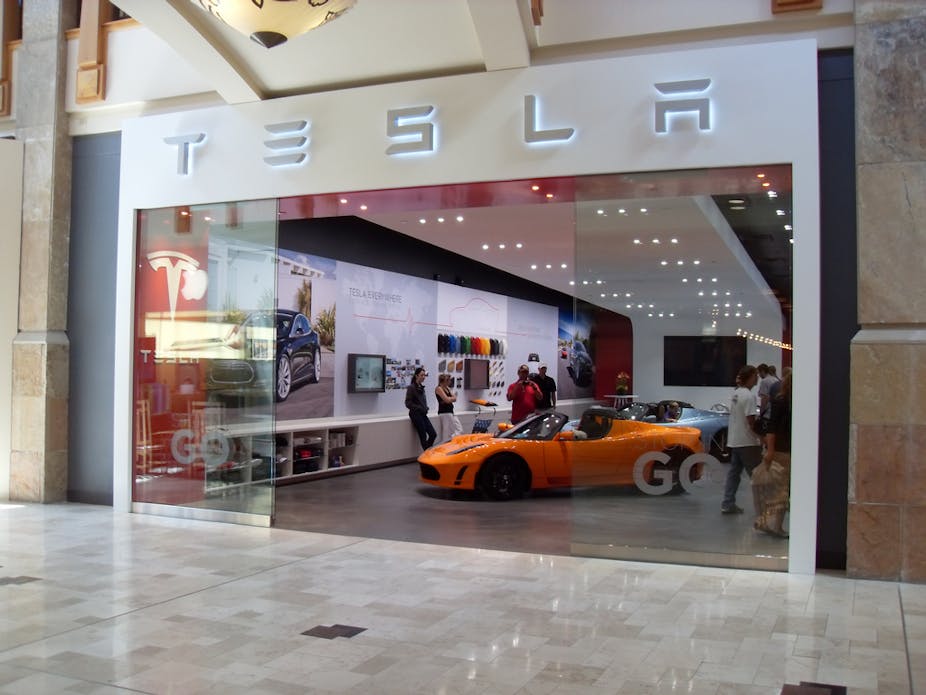Electric vehicle maker Tesla will soon deliver its cars to Australian roads. This promises to change both the type of cars we drive and potentially the way we buy them.
Tesla remains a relative oddity in the US auto market. It is on target to sell around 35,000 cars in 2014, in comparison to GM’s 10 million. But Tesla’s market capitalisation (which is a shade below US$30 billion) is around two-thirds of GM’s – so the pundits see plenty of upside for its EV technology.
Interestingly, it is not just Tesla’s cars and its pioneering technology that have captured the interest of many industry observers, but also its challenge to traditional industry selling practices.
Tesla’s new generation cars
Tesla was founded in 2003, and has been led by Elon Musk since 2004. The South-African born Musk is in the mould of Howard Hughes. He made more than US$100 million as a major shareholder in PayPal (which eBay later acquired), parlaying this into a cornerstone investment in Tesla and another company involved in space exploration, SpaceX.
While the word “eccentric” may be too strong for Musk, he is certainly unbound by convention. For Tesla, Musk has chosen to bypass the traditional automotive retail model in the US. His distribution business model markets its cars directly to consumers. This is generally done through gleaming showrooms in upmarket retail malls – somewhat akin to Apple’s stores with their (ahem) “Genius Bars”.
Surprisingly for some, Tesla’s retail distribution model has been subject to legal challenge in the US. Legislation in many American states tightly regulates the manner in which cars are sold. This legislation was instituted to protect auto retailers from the market power of the auto makers, but has provided the basis of numerous legal appeals aimed at requiring Tesla to adopt a franchise dealer network much like its competitors.
In essence, a move by Tesla to sell cars directly to consumers sets a worrying precedent for many US auto retailers. They can see the possibility of other new entrant car makers (or worse, legacy car makers like GM and Ford) completely bypassing them, eroding their margins and destroying their industry’s viability.
Direct to customers – a better way of selling?
The rise of the internet has caused the role of retail franchisees in many industries to decline in importance. Once an important conduit for information, most customers can now access extensive comparative information online.
In Australia we’ve seen a number of similar approaches, including by furniture firms Matt Blatt and Natuzzi. Here, customers visit company-owned showrooms, but order and have their products delivered direct from the factory.
This approach has reduced inventory and wastage. It also cuts out the retail intermediary level, with its markups and margins. It’s an attractive model for companies like Tesla with strong brand awareness and loyal customers.
Recently, large US-based clothing retailers like Macys have slashed their shipping fees for products sent from their US-based warehouses to Australia. Firms like Kogan have established business models that link Asian factories to Australian consumers, entirely bypassing brands, wholesalers and retailers. Similarly, in grocery retailing, branded manufacturers’ margins are being targeted by retailers like Aldi and Coles who are going directly to generic producers for their own-branded products.
Creative destruction of business models
What we are seeing, from Tesla and elsewhere, is the terminal decline of many of the business models we’ve become accustomed to. Like any major change, this will have both positive and negative impacts – depending on where you stand.
For Australian car buyers, the entrance and potential success of Tesla’s retail distribution model should put downward pressure on Australian car prices. Australians pay among the highest prices in the world for new cars (after controlling for tax variations). In many Australian capitals, car dealers have been outdoing themselves to create ostentatious showrooms, passing on these costs by adding among the highest dealer margins in developed economies. The key problem is no-one asked the customer if they wanted all of the fripperies, or would prefer a lower price.
With a new Model S costing around A$90,000, Tesla is not operating in the discount car market, but a likely trajectory for the Australian automotive retail industry will be the growth of business model innovations that bypass expensive wholesale and retail arrangements. New (and small) entrants like Tesla may be pioneers in this respect, but it’s likely a large player will follow suit once the economics and consumer acceptance of this way of buying cars becomes established.

